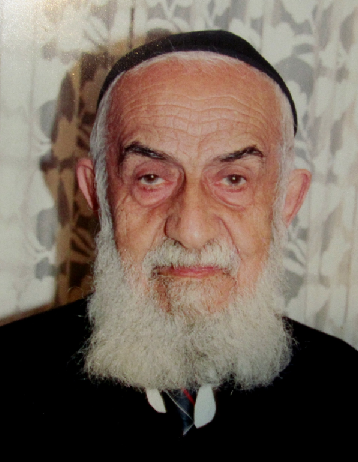
As the first Jewish soldier in Iran’s military from Hamadan and an extraordinary philanthropist for the Jewish community, Rabbi Yaghub Negari’s life spanned religious leadership and profound scholarship. From his amazing talent in memorizing sacred texts as a child in Iran to founding synagogues and schools across the country, and finally migrating to the Holy Land and continuing his studies there, Rabbi Yaghub Negari’s life is an inspiration for generations to come.
Early Life
Family
Yaghub Negari was born in 5670 on the Hebrew calendar, 1910 on the Gregorian calendar, in Hamadan, Iran, into a devout and religious family. He was the son of Haji Rafi’a Negari, a philanthropist and active member of the Hebra Society in Hamadan. The Negari family traced their lineage to a member of the great Sanhedrin in Baghdad, highlighting their deep roots in Jewish tradition.
Haji Rafi’a was involved in the herb trade business in Hamadan while also being a philanthropist and an active member of the Hamadan Jewish Community Association.
An extraordinary memory
From the age of five, Yaghub began learning the Tefilla Siddur, the Torah, and other sacred texts with Rabbi Moshe Ammar, who had come from Israel for humanitarian work in Hamadan. Even as a child, Yaghub demonstrated exceptional intelligence and an impressive memory. He memorized the prayers for the entire year, including those for Rosh Hashanah, Yom Kippur, other holidays, and tefillin, which he had learned from Mollah Aharon and Mollah Yahuda. His father rewarded his dedication by gifting him a beautifully crafted Megilat Esther, which Yaghub also quickly memorized.
Thus, in a short period, Mollah Negari had memorized the Torah, Nevi’im, and Ketuvim, later also accurately memorizing many parts of the Gemara and Mishnah.
Education
School
Yaghub attended Alliance School, excelling in Persian literature, Hebrew, Arabic, and French. He later taught himself Aramaic and English. While studying at Pahlavi School, he memorized numerous verses from renowned Iranian poets like Saadi, Ferdowsi, Sanai, Molavi, Baba Tahir, and Nizami Ganjavi as well as French poets like Lamartine, Victor Hugo, and Descartes. He had also memorized Hebrew (Sephardic) poetry from Rabbi Yahuda Helvi, Rabbi Ibn Gabirol and others just by hearing or reading them once. By high school, Yaghub had memorized over 18,000 Iranian verses, earning him recognition as a talented competitor in poetry, one who surpassed his teachers.
Interfaith knowledge
Rabbi Negari was intellectually vibrant, thoughtful, and hardworking from his youth. Among his educated peers and the prominent figures of the society, it was Rabbi Yaghub who consistently led in social, cultural, and religious endeavors. He knew the Quran by heart, was well-versed in the Baha’i Iqan, the Christian Bible, and the Shia Nahjul Balagha, and frequently participated in interfaith debates. He skillfully countered arguments about converting Jews to Christianity, Islam, or Baha’ism, using solid reasoning and sincere faith. Additionally, among scholars, he had an extensive knowledge of world history, geography, the genesis of religions, philosophy, and logic.
Military service
In 1927, Yaghub Negari became the first Jewish soldier from Hamadan to join Reza Shah’s army, serving in artillery and horsemanship. He completed officer training with distinction and was later appointed as an instructor at the Military Academy. Recognized for his skills in cartography, mathematics, and spatial geometry, he was entrusted with designing and mapping several military barracks in southern Tehran, including Heshmatieh and Eshratabad. He also managed logistics at the Heshmatieh barracks.
Marriage and Religious Career
Marriage
Yaghub married Sarah Khatun from the Nathan Eli family before completing officer training. They had five sons and three daughters.
New figures, new chapter
After his military service, Yaghub began a new chapter as a commissioner in the Tehran market, where he met notable figures such as Rabbi Haim Moreh, Rabbi Davoud Shadi, Rabbi Mollah Yosef Orsharga, Harav Ishagh Meir Levi (Head of Otzar Hatorah Iran), and Rabbi Yedidia Shofet. Through these connections, he deepened his understanding of Judaism, and his profound faith was widely recognized and valued. For many years, Rabbi Yeshua Nathan Eli and Rabbi Oriel Davidi were his study partners in Gemara studies.
Prayer Leader
During his early years in Tehran, Yaghub served as the Prayer Leader (Shaliach Tzibbur) at the Hasan Abad synagogue in Tehran. His resonant voice and captivating delivery in reciting the Torah and daily prayers drew the congregation’s attention and moved their hearts toward the Almighty. His ability to flawlessly recite the daily prayers, Haftarot, their interpretations, and various hymns from memory consistently amazed and inspired the attendees.
Establishing synagogues and schools in Tarasht
He later moved to the Tarasht intersection neighborhood in southwestern Tehran, where, as soon as possible, he established a synagogue and became its manager and Prayer Leader. With support from Otzar Hatorah, which he was an active member of, he built a three-story elementary school for Jewish children in the area.
Yousef Abad Synagogue
In 1961, he moved to the Yousef Abad neighborhood, where he, along with the late Yusian and others, founded the famous Yousef Abad Synagogue, known for its exquisite tile work, one of the most beautiful in the world. As an active and influential member of Otzar Hatorah, he also established the Ganj-e Danesh schools in that neighborhood, significantly enhancing the educational opportunities for the Jewish community in northern Tehran.
Character
Always humble
Yaghub was always humble, despite his vast knowledge and respect within the community. He never indulged in boasting or pride. Instead, he was known for his humor, responsibility, and punctuality. He always led people toward the path of truth, justice, and kindness.
Deeply committed
Rabbi Yaghub was deeply committed to the Jewish community, particularly focusing on the youth and young adults, and he never spared any effort to support and guide them.
Greatly trusted in the market
For forty years, he worked as a trader and commissioner of goods in the Tehran Bazaar, conducting his business with honesty, trustworthiness, and wisdom. This earned him a reputation as a trusted figure among the merchants. He also quietly led efforts to collect financial aid and assist the needy.
Selfless community dedication
In his memoirs, he noted, “I wrote hundreds of prayers and amulets for the health of humanity, infertile mothers, young men and women seeking marriage, and those in search of sustenance and happiness. I dedicated all the proceeds from these efforts to establishing a larger, more comfortable synagogue for Iranian Jews, never aiming for personal gain. I was always concerned with the welfare of the people and the unity of the Jewish community.”
Migration to the Holy Land
Mastering Kabbalah
In 1976, driven by his love for the Holy Land, Rabbi Yaghub migrated with his family and settled in Jerusalem. After establishing his home, he founded a religious and cultural center for the Iranian Jewish community. He also began studying Jewish law and Kabbalah at a yeshiva, dedicating himself to this pursuit until the final days of his fruitful life, fulfilling his long-standing dream of mastering Kabbalah.
The knowledge he gained from his studies enabled him, as a Kabbalist, to provide greater assistance to those in need. Rabbi Yaghub tirelessly pursued his philanthropic goals, never hesitating to help others as he sought to fulfill his lifelong aspiration of serving the community.
Late-age publications
Despite his old age, Rabbi Yaghub Negari managed to author seven books:
- Tekhelet Yaghub (“Praises of Yaghub”),
- Kehillah Yaghub (“Congregation of Yaghub”),
- Abd-e Yaghub (“Servant of Yaghub”),
- Pand-e Pedaran (“Advice of the Fathers”),
- Yeshu’ot Yaghub (“Salvations of Yaghub”),
- Setareh Yaghub (“Star of Yaghub”), and
- She’reh HaGilgulim (“Poem of the Reincarnations”).
He also wrote several valuable treatises on the Torah and subjects related to faith, Jewish customs, and the future responsibilities of the Jewish people until the coming of the Messiah.
Soon, his books and writings spread worldwide, reaching Farsi-speaking Jewish communities and attracting many enthusiasts of religious studies.
Final Days
This devout and pious figure spent his final days immersed in prayers and fasting for the establishment of peace and health in the world. In 1996, in recognition of his humanitarian services, Rabbi Yaghub Negari was honored with a special certificate of recognition from the Prime Minister of Israel.
Rabbi Yaghub Negari passed away on the morning of Shabbat, the 25th of Shevat 5758 (February 1998), after a period of illness, at the age of 88. May his soul rest in peace.
Timeline of Key Events
1910: Born in Hamadan, Iran.
1927: Joins Reza Shah’s army as the first Jewish soldier from Hamadan.
1940s: Marries Sarah Khatun; they have five sons and three daughters.
1961: Establishes Yosef Abad Synagogue in Tehran.
1976: Migrates to Jerusalem and establishes a religious and cultural institution.
1996: Receives a certificate of recognition from the Prime Minister of Israel.
1998: Passes away in Jerusalem at the age of 88.


 فارسی
فارسی